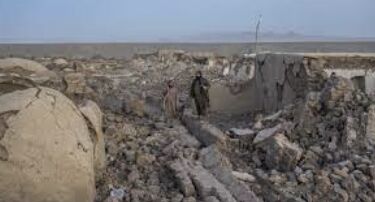Devastating Earthquake Rocks Afghanistan: International Aid Organizations Rally to Assist Survivors Amidst Economic Turmoil and Conflict Aftermath
International aid organizations are working tirelessly to provide assistance to survivors of a devastating earthquake in Afghanistan. The quake, measuring 6.3 on the Richter scale, has resulted in over 2,000 deaths and numerous injuries. This catastrophe has compounded the challenges faced by a nation already grappling with economic turmoil and the aftermath of prolonged conflict. UN agencies and partners are coordinating emergency operations and deploying additional teams to bolster ongoing relief efforts, but more global assistance is urgently needed. Afghanistan remains in dire need of international aid and support as it grapples with the aftermath of this devastating natural disaster.
International aid organizations are working tirelessly to provide assistance to survivors of a devastating earthquake in Afghanistan. The quake, measuring 6.3 on the Richter scale, struck the western province of Herat, resulting in over 2,000 deaths and numerous injuries. This catastrophe has further compounded the challenges faced by a nation already grappling with economic turmoil and the aftermath of prolonged conflict. The earthquake, which occurred 25 miles west of Herat city, is one of the deadliest to hit Afghanistan in recent years. Images from the affected areas depict buildings reduced to rubble and debris.
Thousands have been killed & hurt by the earthquake this weekend in Afghanistan...already @wckitchen teams have been working with InstantAid, our partners from another big earthquake last year, andwe will be cooking hot meals for the people who they need it! #ChefsForAfghanistan pic.twitter.com/8gg3LOUeKR
— José Andrés 🇺🇸🇪🇸🇺🇦 (@chefjoseandres) October 10, 2023
Survivors have sought refuge in the streets, fearing further tremors. Thamindri de Silva, the national director of World Vision Afghanistan, described the situation as even worse than anticipated. Residents in devastated villages are desperately attempting to rescue survivors from under the wreckage using only their bare hands. Despite reinforcements from the capital city, Kabul, there is only one overwhelmed hospital, leading to the transfer of critical cases to private facilities. Mark Calder, the advocacy lead for World Vision Afghanistan, lamented the compounding crises facing the country, citing decades of conflict, recurring droughts, and a collapsed economy.
He emphasized that international funding for humanitarian efforts has been inadequate and urged governments and donors worldwide not to overlook the suffering of the Afghan people. UN agencies and partners are actively coordinating emergency operations and deploying additional teams to bolster ongoing relief efforts. UN Secretary-General António Guterres expressed solidarity with Afghanistan and called on the international community to unite in support of the earthquake-affected population, many of whom were already living in desperate conditions prior to this catastrophe.
UNICEF, the UN's children's fund, has dispatched crucial supplies, including hygiene kits, family kits, winter clothing, blankets, and basic household items, to aid ongoing humanitarian initiatives. Ground teams are conducting further assessments and providing emergency medical supplies and tents to overwhelmed health clinics. The Taliban, which took control of Afghanistan in August 2021, reported that the earthquake claimed the lives of over 2,000 people and left thousands injured, with numerous houses fully or partially destroyed. Concerns persist that the casualty count could increase.
Afghanistan, one of Asia's poorest nations, has long been mired in conflict and instability. The Taliban's resurgence further isolated the country from the international community, resulting in a halt to vital aid programs and a crippling loss of foreign funding. Afghanistan's vulnerability to earthquakes is compounded by its ongoing economic hardships. China, Afghanistan's neighbor, has pledged to do its best to assist in the disaster relief efforts in light of Afghanistan's pressing needs, according to a statement from its foreign ministry.
However, only a small number of countries have publicly offered support, indicating a need for urgent global assistance. Efforts to rescue survivors and assist those affected by the earthquake continue. As more remote villages are reached and assessed, the number of casualties and affected individuals is expected to rise. Afghanistan remains in dire need of international aid and support as it grapples with the aftermath of this devastating natural disaster.




